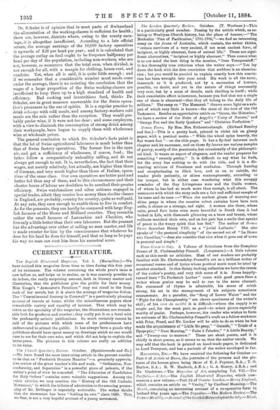The London Quarterly Review. October. (T. Woolmer.)—This is a particularly
good number. Passing by the article which, as re- lating to Wesleyan Church history, has the place of honour,—" 'rim Methodist 'Plan of Pacification,' 1791-1795,"—we find an interesting essay on the fauna of Australia, which contain, the writer thinks, "certain survivors of a very ancient, if not most ancient form, of incipient, or highly aberrant, form of animal life." These are signi- ficant alternatives, "incipient or highly aberrant." Then comes what is to our mind the best thing in the number, "Ivan Tourgnenieff." It is a thoroughly true criticism when the writer says :—" You lay down the book with the firm conviction that serfdom is an abomina- tion; but you would be puzzled to explain exactly how this convic- tion has been wrought into your mind. His work is all the surer, inasmuch as it is produced, not by a succession of horrors, possible, no doubt, and yet in the nature of things necessarily very rare, but by a mass of details, each thrilling in itself ; while their cumulative effect is immense, because you feel that not a single one of them is abnormal—that they all belong to the daily life of millions." The essay on "The Efassorah " throws some light on a sub- ject of which very little is known—the state of the text of the Old Testament. Besides an appreciative article on "Green, the Historian," we have a review of the Doke of Argyll's "Unity of Nature," and " George Fox and the Early Quakers" and Christian Perfection."


































 Previous page
Previous page